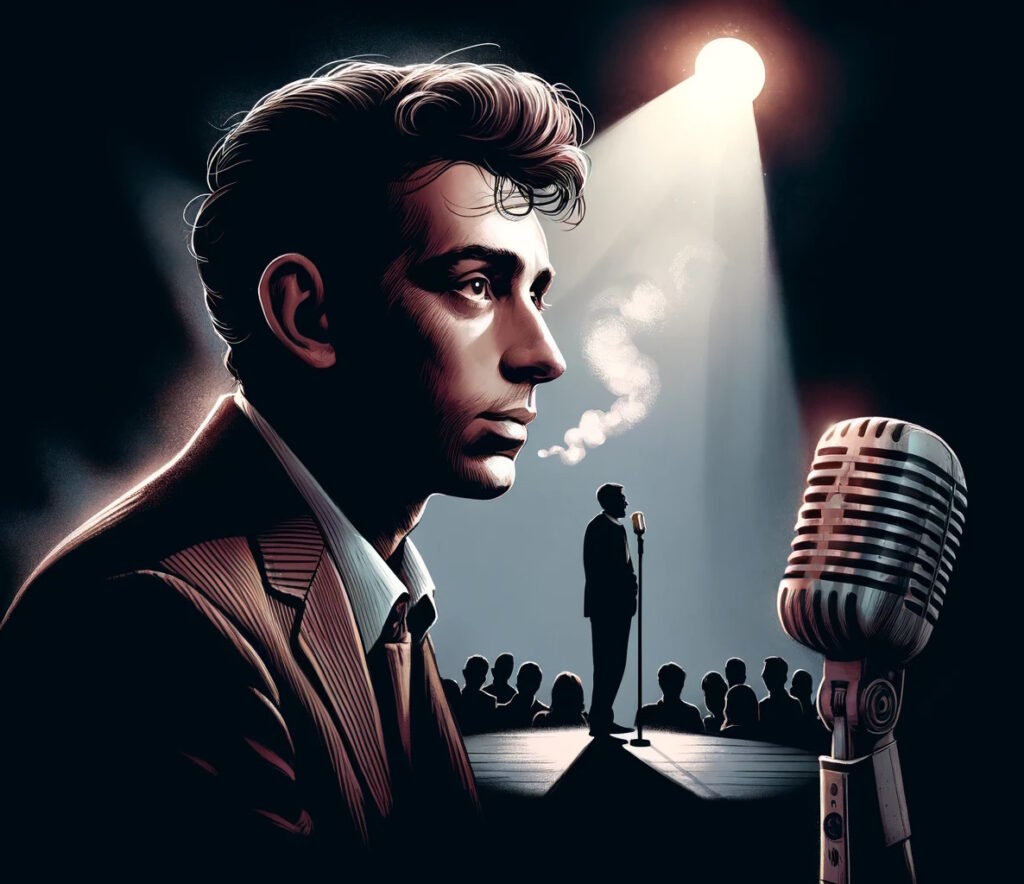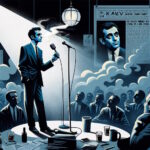Who was Lenny Bruce?
Lenny Bruce was an American stand-up comedian, social critic, and actor who was born on October 13, 1925, in Mineola, New York. He is widely regarded as one of the most influential and controversial comedians of the 20th century.

Early Life and Career
Bruce was raised in a Jewish family in Brooklyn, New York. He began his career as a stand-up comedian in the 1940s and quickly gained a reputation for his irreverent style of comedy, which often included satire, social commentary, and obscenity. In the late 1950s and early 1960s, Bruce became a regular performer at the famous Greenwich Village comedy club, The Village Vanguard.
Controversy and Legal Troubles
Bruce’s comedy often tackled sensitive topics such as sex, religion, and politics, which led to him being arrested multiple times for obscenity. In 1964, he was arrested in Chicago for using obscene language during a performance at the Playboy Club. The arrest led to a landmark Supreme Court case, “Bruce v. City of Chicago,” which ruled that local governments could not ban obscene material unless it was proven to be “patently offensive.”
Social Commentary and Satire
Bruce’s comedy often tackled social issues such as racism, sexism, and religion. He was known for his biting wit and his ability to use satire to expose societal hypocrisy. In his 1964 album “The Last Time Seth,” Bruce famously mocked the civil rights movement, saying, “The Negroes want to be treated like human beings. Can you understand that?”
Personal Life and Death
Bruce struggled with drug addiction throughout his life and died on October 3, 1966, from an accidental heroin overdose. He was just 40 years old at the time of his death. Despite his tragic end, Bruce’s legacy as a groundbreaking comedian and social critic continues to inspire new generations of comedians and comedy fans.
Legacy and Impact
Bruce’s influence on modern comedy is undeniable. He paved the way for comedians such as George Carlin, Richard Pryor, and Eddie Murphy, who all cite him as an inspiration. His irreverent style of comedy and his willingness to tackle controversial topics helped to challenge societal norms and push the boundaries of what was considered acceptable in comedy.
Lenny Bruce was a pioneering comedian and social critic whose groundbreaking style of comedy continues to influence generations of comedians and comedy fans. His irreverent wit, biting satire, and willingness to tackle controversial topics helped to challenge societal norms and push the boundaries of what was considered acceptable in comedy. Despite his tragic end, Bruce’s legacy as a comedy legend remains unchallenged.











Leonard “Lenny” Bruce was an influential American stand-up comedian, social critic, and satirist who emerged in the 1950s and 1960s. Born on October 13, 1925, in Mineola, New York, his full name was Leonard Alfred Schwartz. His parents were Jewish immigrants from Eastern Europe, and he grew up during the Great Depression era in a lower-middle-class family.
Bruce began his career as a young man by working various jobs, including stints as an ice cream salesman and a shoe store worker. He first performed comedy on radio shows before transitioning to live performances at local clubs. His unique comedic style blended humor, social commentary, and provocative language that challenged societal norms of the time.
Lenny Bruce’s act was innovative for its time, as he incorporated storytelling, one-liners, and improvisation in a way that broke the traditional mold of stand-up comedy. His routines often centered around controversial topics like politics, religion, and race. He pushed the boundaries of what was considered acceptable humor, using vulgarity to criticize society and expose its hypocrisies.
Bruce’s openness about his own life experiences, such as drug use and relationships with women, helped establish a confessional style that would later become popular in comedy. He also experimented with different formats for his performances, including appearing on television and Broadway shows. Some of his famous works include “Lenny Bruce on Stage,” a 1963 album, and a one-man show called “Lenny Bruce: The Intellectual’s Nightmare” that played in New York City during the late ’50s.
Despite receiving widespread acclaim from critics and fellow comedians, Lenny Bruce faced numerous legal challenges throughout his career due to obscenity laws of the era. He was arrested multiple times for using profanity on stage, which led to a series of trials that ultimately did not convict him but drained his resources and damaged his health.
Tragically, Bruce died at the age of 40 on August 12, 1966, due to an overdose of morphine, likely administered by his wife as a result of their tumultuous relationship and her own struggles with mental health issues. His death occurred during the height of his career, which only fueled public interest in his work, leading to posthumous popularity.
Lenny Bruce’s influence can be felt throughout modern comedy, as he paved the way for many comedians to explore controversial topics and push boundaries. Today, he is considered an iconic figure who revolutionized stand-up comedy, and his unique blend of humor, social commentary, and satire has inspired generations of performers that followed in his footsteps.